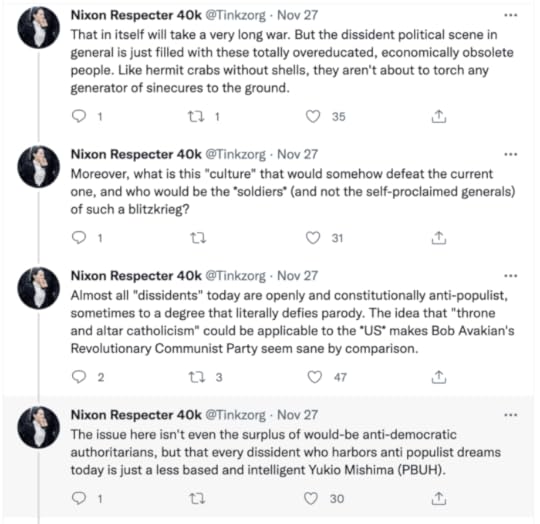Think Tank Thomas Aquinas
Several of you readers have written to me in the past few days to note that Team Integralist seems to be trying to turn me into the new David French, and to ask if I’m okay. Um, yeah, why shouldn’t I be? The Internet is not real life. This is all tempest-in-a-teacup stuff, and somehow I think I’ll survive being off of Adrian Vermeule’s Christmas card list. I have to share with you, though, this e-mail I received this afternoon from an important GOP Congressional staffer, whose name and affiliation (meaning where he works) I’m going to withhold. I should point out, though, that this staffer is not an Establishment Republican who just wants to return to the pre-Trump status quo:
Just wanted to put in a word of appreciation for your recent writings on the future trajectory of conservatism, especially given all the blowback online from our “side.” Working in [GOP office], I’m pretty up-to-speed on current debates surrounding integralism and the direction things are headed. (I’ve read plenty of Vermeule, Ahmari, Waldstein, Crean & Fimister, and the rest.)
That crowd seems pretty far removed from the realities of the moment, so let me be very blunt here. Nobody with a day job in public policy—and I mean nobody—is going to wade through thousands of words of neo-scholasticism at The Josias in order to puzzle out how to wield political power. What the “realignment” movement really needs are practical solutions that can be translated into Overton-window-shifting legislation, and we need them right now. We need cover articles in American Affairs on topics like “A National Conservative Approach to Health Insurance.” (To his credit, Gladden Pappin at the University of Dallas has been really good about this.) This is the sort of thing that can get translated into actual legislative proposals, which “normal” people will at least discuss.
I totally get why nobody wants to do this work. This stuff is boring, and technical, and requires developing some subject-matter competence. It’s a lot more fun to take potshots at David French.
But the fascinating paradox here is that while much of the integralist crowd faults you for being unwilling to confront the challenges of the day, in practice that’s exactly what they themselves are doing! Spending endless hours building out an intricate model of the perfect Catholic regime, and the suitable conditions under which it can seize baptized children from their parents (and justifying all this time and attention by claiming they’re simply stressing the “primacy of the speculative”), is nothing more than Ph.D.-level daydreaming. It’s an air castle. But it’s an easy alternative to doing the grinding, boring, “technocratic” work of proposing and defending actual policies.
(By contrast, your Benedict Option writings offer concrete tactics for navigating current and future conditions. That’s what seems to be completely out of view in their arguments.)
If I sound annoyed, it’s because so much of the intellectual oxygen in the postliberal space is being sucked up by people who are basically just repeating the same set of high-level claims over and over and over again. Yes. We get it. We can all agree that liberal neutrality is a façade and that we need to reinvest in individual workers and defend the common good. But on the ground, we need people who can talk seriously about things like the child tax credit, the Administrative Procedure Act, and the Administrative Office of the U.S. Courts. Else, we’ll be incapable of effectively wielding power when we get it.
Anyway, rant over. Just thought you might appreciate hearing from someone who’s in the trenches right now.
I do appreciate it. This echoes what I’ve been hearing privately since the National Conservatism conference from conservative Catholics and others who are in the public policy trenches: that integralism, and integralist-adjacent speculation might be an interesting intellectual activity, but it is massively disconnected from the realities we are now facing, and is at best a distraction from initiatives that might actually work.
The Republican Party is likely to retake Congress in the 2022 midterms. What is a realistic legislative agenda that could be accomplished in this actually existing country? I’m not a public policy thinker, and not really a political thinker at all. Religion and culture is my wheelhouse, which is why the Benedict Option is more about what we can do culturally — though I of course recognize that politics has to be part of the resistance (and say so in the book). But I don’t want the perfect to be the enemy of the best-we-can-do-right-now. We do need a broader and deeper vision of the Good, but something tells me that in America, it’s not going to come out of Catholic integralism.
Malcolm Kyeyune has a provocative Twitter thread about this kind of thing. Excerpts:



The Right needs concrete, achievable policy proposals. But it also needs new stories, or rather, Stories. Most people think narratively. To be honest, despite all the doubts I have about late liberalism, I think the old-fashioned American story is still a pretty good one, or at least better than any competitors. I was listening earlier today to the English “reactionary feminist” commentator Mary Harrington talking about how liberalism isolates people and alienates them from each other, from their past, and from anything higher than the self — and how this is a dead end. I also listened to the Quillette podcast with Batya Ungar-Sargon in which she said that she used to be woke, and is still a socialist, but an anti-woke one. She said that she came to realize that woke progressivism is in fact class war against the poor and working Americans on behalf of the ruling elites. You don’t need to be against classical liberalism simpliciter to agree with them that the state of liberalism today is not working for the common good.
Both of these women were at the NatCon conference, though neither are conservatives. There’s some really interesting stuff going on, both intellectually and in terms of policy potential. What about new stories, though? It is incredible that the Right has allowed the toxic woke story of America to go largely unchallenged. True, the woke have almost all the media, but can’t we do better than we have been? Reheated Reaganism is not the answer, obviously, nor is an unreflective nostalgia. But it seems to me that there is still a lot to work with within the American tradition. Classical liberalism is deeply flawed, perhaps fatally, but it’s the only tradition we have in this country. Besides, we were once a country that had a lot more solidarity, even though we had classical liberalism. Unless we have a true revolution in America, our future will evolve out of classical liberalism, because that is what we know. My thought is that we should take Patrick Deneen’s excellent critique of liberalism (Why Liberalism Failed), and figure out what it has to teach us about ways that we can reform liberalism in a Burkean way — that is, building on what can be salvaged from our own native tradition.
Deneen himself (I think) believes that this can’t happen, and maybe he’s right. But if he is, then it seems to me we are much more likely to get some form of socialism in this country, or right-wing authoritarianism in a distinctly American key (e.g., the Protestant Generalissimo Michael Flynn) than anything that would satisfy the throne-and-altar integralists.
The post Think Tank Thomas Aquinas appeared first on The American Conservative.
Rod Dreher's Blog
- Rod Dreher's profile
- 503 followers



